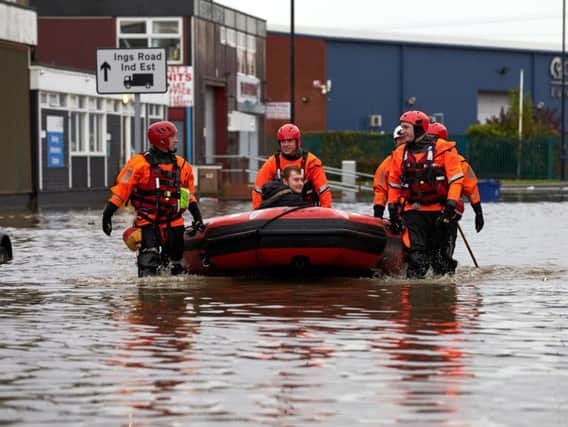Flooding is "biggest generational betrayal since World War II", say environment experts


The department would coordinate investment nationally, get local authorities to work together better and set new building standards.
Advertisement
Hide AdAdvertisement
Hide AdDr Hugh Ellis, director of policy at the Town and Country Planning Association told the Yorkshire Post that Britain urgently needed new national resilience laws.
He said: “This is moving it into a wartime footing and national government needs to play an enormously enhanced role. That requires one thing above all else, a National Resilience Act. We need a new law and a new government department to go with it because this is going to keep happening.”
He added that local and national governments have known Britain would suffer major floods for 30 years but failed to act on it.
“Probably the greatest political betrayal of future generations ever to take place in this country was for national government to walk away from its responsibility on climate change.”
Advertisement
Hide AdAdvertisement
Hide AdThis comes as the Environment Agency was forced to defend itself after South Yorkshire Police and Crime Commissioner Dr Alan Billings said it was not clear whether decisions at the organisation about flood prevention were happening with local people in mind. He said: “Do we need greater transparency around its decisions and greater local accountability for them?”
An Environment Agency spokesman said there was a legal requirement that flood defences cannot increase the flood risk of communities either upstream or downstream, adding: “Flood defence investment takes place where the risk is highest, wherever it is across the country and where it will benefit the most people and property.”
Between 2015 and 2021, the Environment Agency and partners are investing more than £600m on more than 220 flood defence projects in the region.
Also in news: Yorkshire power station Drax reveals plans to supply 80 per cent of biomass from its own sources
Advertisement
Hide AdAdvertisement
Hide AdDr Jonathan Bridge, an expert on flooding and senior lecturer in physical geography at Sheffield Hallam University said it was too simplistic to say flood prevention measures in one place would lead to flooding elsewhere because there are so many different factors.
He said: “It’s a collective ignorance. [As a country] we’ve assumed that we can manage and engineer the water, that flooding is something we can control.
“Extreme events like we saw two weeks ago suggest that we can't control everything.”
While flooding could not be prevented entirely, society could learn to cope better when it does occur, he said.
Advertisement
Hide AdAdvertisement
Hide Ad“There's lots of information out there about how you can flood-proof your property and develop a flood plan but it’s all optional and there’s no money behind it.”
New homes built in high-risk areas do not have to be flood-proof by law, despite recommendations to the government by the Pitt Review, which was carried out after the Boxing Day floods in 2007.
Both scientists stressed that flooding was set to get considerably worse and there was not enough being done to nationally prevent it or to deal with the fallout for the increasing numbers of people affected. Without government action, many people will find themselves unable to insure their homes next year, for example, and there is currently no compensation scheme in place.
Advertisement
Hide AdAdvertisement
Hide AdProfessor Piers Forster, professor of climate physics at the University of Leeds, and member of the UK Committee on Climate Change said Britain needed to “make some hard decisions”.
He said some of the preventative work needed to be done in the uplands many miles away from where floods occur, which meant it was important for wider communities to communicate.
“You need to do as much as possible to control [the water] in the uplands and that is always worth a lot more - by slowing it down at the beginning, you get a lot more benefit downstream.”
He added: “We have to get on with this stuff.”
Dr Ellis called for “massive leadership inside Yorkshire… the likes of which we haven’t seen before”, adding that local authorities needed to hold an emergency meeting before Christmas and set demands for national government.